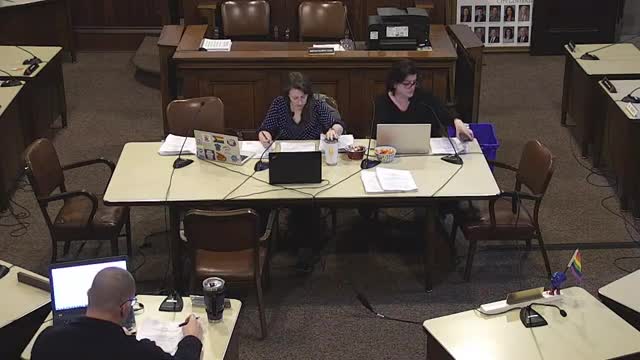Holyoke committee debates year‑end transfer rules and ‘first/second reading’ practice after dueling legal opinions
Get AI-powered insights, summaries, and transcripts
Subscribe
Summary
Councilors debated whether a 2017 state change allowing majority year‑end transfers preempts a century‑old charter rule requiring two‑thirds votes; the committee received legal memoranda and will rely on clerk and legal staff for follow‑up.
Holyoke’s Charter Rules Committee spent substantial time April 2 addressing whether state law and Department of Revenue guidance allow the City Council to use a simple majority vote for certain year‑end appropriation transfers or whether the city’s charter requires a two‑thirds vote.
Assistant City Solicitor Bissonnette and councilors discussed competing legal views: Department of Revenue guidance issued after a 2017 amendment to state law (Chapter 44, §33B) says municipalities "may" adopt certain end‑of‑year transfers by majority vote in the final weeks of a fiscal year; outside counsel (KP Law) and the city solicitor have issued opinions interpreting state statutes and the charter differently.
Councilor Dink argued the charter controls and that the council is bound by Section 49 of the Holyoke City Charter, which historically has required a two‑thirds vote for appropriation transfers. "There is no preemption," Dink said. "Our section 49 governs here." Other speakers, including members who obtained KP Law’s memorandum and the city solicitor, urged a reading that harmonizes the charter with the later, more specific statutory language, noting DOR guidance that local charters remain controlling where they explicitly provide otherwise but that the 2017 amendment was intended to provide a narrow majority‑vote option for year‑end transfers.
Committee members said the dispute arises from textual differences and from seven years of past practice: several councilors noted that between 2017 and 2024 the procedure was not treated as a preemption issue, and more recently dueling interpretations emerged when a year‑end transfer was proposed and debated.
The committee formally received the city solicitor’s memo and the DOR guidance and discussed a KP Law opinion that counseled harmonizing the charter and statutes to effect the intent of the more specific, later statute. After discussion the committee voted to receive items 3 and 4 (the solicitor memo and the DOR guidance). Later in the meeting the committee reconsidered and marked items 3 and 4 complied with. Committee members also received related items on voting practice (items 5–9) and discussed Section 22 of the charter, which governs first and second readings for ordinances and votes involving appropriations.
That Section 22 language — "every such ... shall be read twice, with an interval of at least 3 days between the 2 readings before being finally passed" — prompted a separate, long debate about what constitutes a "first reading." Some members said the chair’s reading and referral to committee, followed by a committee report and an explicit vote to pass first reading, is the historic practice. Others said republication of the order and committee referral can satisfy the intention of prior notice and that the text is open to more than one interpretation; they noted Fuller v. Haines (1916) and other precedents cited in the memoranda.
Committee members proposed several next steps: the clerk should provide historical turnout and practice data and the committee will await written clarifications from the law department and the outside opinion authors if requested. Several councilors urged adopting a clearer local rule so future votes are consistent and defensible.
The committee voted by voice to receive and later mark as complied with the legal memoranda and related items; where votes were taken they were recorded as "Aye" on voice votes without roll call details. The group did not adopt a final legal interpretation; members left open the option of charter or rule changes to clarify the voting thresholds and the mechanics of first and second readings.
Committee Chair Meg McGrath Smith said she would seek additional data and work with the clerk on drafting possible rule changes for future committee consideration.
